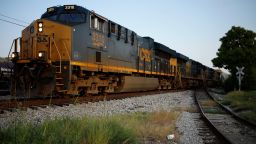New Jersey Transit, one of the largest commuter rail services in the country, is now facing the same kind of labor problems that nearly brought service on the nation’s freight railroads to a halt last year.
The railroad, which carries tens of thousands of commuters daily between New Jersey and New York City, was the third largest commuter rail in the country based on average weekday ridership of 240,000 passengers ahead of the pandemic, trailing only the other two commuter railroads serving the New York suburbs. It was second in total annual ridership.
But wages for engineers at NJ Transit badly trail wages at those other two commuter lines as well as Amtrak and PATH, another railroad also linking New Jersey and New York.
The Brotherhood of Locomotive Engineers and Trainmen, the union which has been seeking a new contract since the last one’s scheduled end in 2019, says if members don’t get raises of 18% to 23% to match those competing railroads, its 500 members at NJ Transit could be lost to those other railroads. That could cause a shortage of engineers and a reduced train schedule, according to union leadership.
“We don’t want to hurt the riding public. But NJ Transit is adamant they won’t negotiate at all,” said Jim Brown, president of the New Jersey Transit portion of the Brotherhood of Locomotive Engineers and Trainmen. “We’ve become a training facility for other railroads. We don’t expect to make more than them. All we’re looking for is parity.”
The National Mediation Board, the federal agency that oversees labor relations at the nation’s railroads and airlines, has called negotiators for railroad management and for the Brotherhood of Locomotive Engineers to meet in Washington next month.
More than three years of negotiations
The union says the call to hold talks in Washington is a sign that the negotiations are no longer productive, and the clock needs to start ticking towards allowing the engineers the right to go on strike.
But railroad management says it still sees value in the mediated negotiations that began in January of 2020. It is pushing the union to accept the deal similar to those accepted by other unions at the railroad.
“There is no impasse,” said the statement from commuter service. “NJ Transit is currently engaged in active and ongoing mediation. We have made a fair and pattern-based contract offer that has been accepted and ratified by 14 of our 15 rail unions covering 91% of our rail-union employees. The BLET is the only union to not accept these terms.”
A strike at New Jersey Transit would cause massive gridlock in northern New Jersey, especially for commuters who cross the Hudson River to work in New York City, even though ridership has yet to return to pre-pandemic levels. The railroad said it’s back to 55% to 70% of pre-Covid ridership, depending on the day of the week.
Rail labor law could delay strike until 2024
But the Railway Labor Act, the arcane century-old federal law that controls labor relations at railroads and airlines, means that passengers don’t need to worry about a strike starting anytime soon. It could take as much as nine months for a strike to start, pushing the risk of a walkout into 2024.
The NMB declined to comment on how it views the state of the talks. But one thing that could happen when the talks move to Washington next month is that the full board could make an offer to the two sides to submit the long-running disagreement to binding arbitration.
Both sides would need to agree to that offer for it to take place, and in all likelihood, given the nature and history of labor negotiations in the sector, there is basically zero chance of that happening. Rejection of the offer would likely start the clock ticking on a possibility of a work stoppage, such as a strike.
For the freight railroads and airlines, it can take three months between the offer of binding arbitration and the possibility that a union could go on strike. In the case of commuter rail, there are additional steps that would need to be followed before there a strike would be allowed to start, compared to the rules that apply at freight railroads and airlines. Those rules unique to commuter railroads can mean it can take three times as long for a strike to be allowed.
And even after that nine-month period has run out, there is the possibility that Congress could step in and impose a contract on the two sides that keeps the union members on the job.
That is what occurred at the nation’s major freight railroads late last year, when rank-and-file member of about half of the rail unions voted against tentative deals that their unions had reached with management, and were preparing to go on strike.
Congress has allowed commuter railroads to strike
A strike that would have stopped all the freight railroads, since even the unions that had accepted deals with management, would have refused to work when other unions were on strike.
A freight rail strike would have kept about 30% of the nation’s freight from moving and been a crippling blow to the nation’s economy and supply chain. That is why even President Joe Biden, who portrays himself as a very pro-union president, and pro-union members of Congress, supported congressional action to keep rail workers on the job.
Still, while a strike at NJ Transit would clog roadways and cause headaches for passengers, wouldn’t cause the same kind of broad, nationwide economic upheaval as a freight rail strike
For that reason, while Congress has not stood by and allowed the nation’s freight railroads to have a strike longer than a few hours, there have been numerous examples of commuter rail strikes that have stretched on for weeks, even months without Congressional action to end it.
Back in the 1980s, New Jersey Transit was on strike for one month, the Southeastern Pennsylvania Transit Authority, or SEPTA, was on strike for 108 days, Metro North, which is the commuter line serving the suburbs north of New York, was on strike for 42 days, and an 11-day work stoppage occurred on the Long Island Railroad.
While management of freight railroads answer primarily to their shareholders, the commuter rail services run under government-appointed agencies, and governors who appoint their boards have to worry about commuter anger if strikes take place or drag on.
New Jersey Gov. Phil Murphy’s press office declined to respond on the state of negotiations at NJ Transit when asked for a comment by CNN late last year, referring all questions to NJ Transit.

